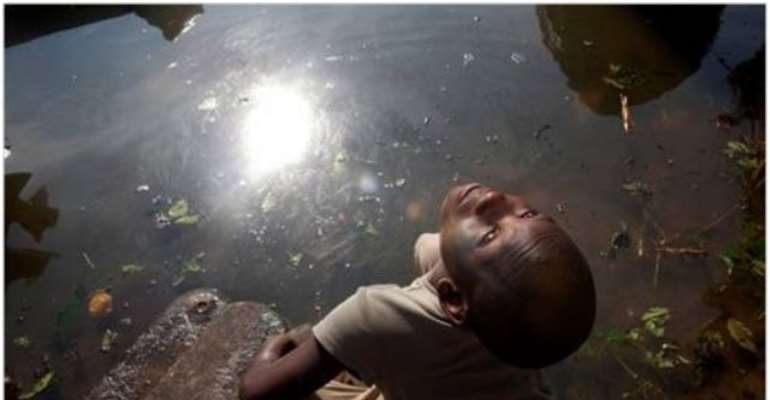Niger Delta becomes a cautionary tale for U.S.

Region has endured equivalent of Exxon Valdez spill every year for 50 years
BODO, Nigeria - Big oil spills are no longer news in this vast, tropical land. The Niger Delta, where the wealth underground is out of all proportion with the poverty on the surface, has endured the equivalent of the Exxon Valdez spill every year for 50 years by some estimates. The oil pours out nearly every week, and some swamps are long since lifeless.
Perhaps no place on earth has been as battered by oil, experts say, leaving residents here astonished at the nonstop attention paid to the gusher half a world away in the Gulf of Mexico. It was only a few weeks ago, they say, that a burst pipe belonging to Royal Dutch Shell in the mangroves was finally shut after flowing for two months: now nothing living moves in a black-and-brown world once teeming with shrimp and crab.
Not far away, there is still black crude on Gio Creek from an April spill, and just across the state line in Akwa Ibom the fishermen curse their oil-blackened nets, doubly useless in a barren sea buffeted by a spill from an offshore Exxon Mobil pipe in May that lasted for weeks.
________________________________________
________________________________________
The oil spews from rusted and aging pipes, unchecked by what analysts say is ineffectual or collusive regulation, and abetted by deficient maintenance and sabotage. In the face of this black tide is an infrequent protest — soldiers guarding an Exxon Mobil site beat women who were demonstrating last month, according to witnesses — but mostly resentful resignation.
'Shell oil on my body'
Small children swim in the polluted estuary here, fishermen take their skiffs out ever farther — “There's nothing we can catch here,” said Pius Doron, perched anxiously over his boat — and market women trudge through oily streams. “There is Shell oil on my body,” said Hannah Baage, emerging from Gio Creek with a machete to cut the cassava stalks balanced on her head.
That the Gulf of Mexico disaster has transfixed a country and president they so admire is a matter of wonder for people here, living among the palm-fringed estuaries in conditions as abject as any in Nigeria, according to the United Nations. Though their region contributes nearly 80 percent of the government's revenue, they have hardly benefited from it; life expectancy is the lowest in Nigeria.
“President Obama is worried about that one,” Claytus Kanyie, a local official, said of the gulf spill, standing among dead mangroves in the soft oily muck outside Bodo. “Nobody is worried about this one. The aquatic life of our people is dying off. There used be shrimp. There are no longer any shrimp.”
In the distance, smoke rose from what Mr. Kanyie and environmental activists said was an illegal refining business run by local oil thieves and protected, they said, by Nigerian security forces. The swamp was deserted and quiet, without even bird song; before the spills, Mr. Kanyie said, women from Bodo earned a living gathering mollusks and shellfish among the mangroves.
A cautionary tale for the U.S.
With new estimates that as many as 2.5 million gallons of oil could be spilling into the Gulf of Mexico each day, the Niger Delta has suddenly become a cautionary tale for the United States.
As many as 546 million gallons of oil spilled into the Niger Delta over the last five decades, or nearly 11 million gallons a year, a team of experts for the Nigerian government and international and local environmental groups concluded in a 2006 report. By comparison, the Exxon Valdez spill in 1989 dumped an estimated 10.8 million gallons of oil into the waters off Alaska.
So the people here cast a jaundiced, if sympathetic, eye at the spill in the gulf. “We're sorry for them, but it's what's been happening to us for 50 years,” said Emman Mbong, an official in Eket.
The spills here are all the more devastating because this ecologically sensitive wetlands region, the source of 10 percent of American oil imports, has most of Africa's mangroves and, like the Louisiana coast, has fed the interior for generations with its abundance of fish, shellfish, wildlife and crops.
